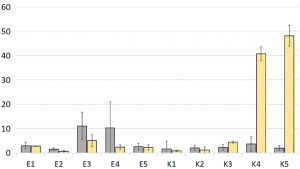A group from University of Life Sciences in Lublin, Lublin, Poland, etc. has reported on differences in carrot’s rhizosphere bacteria and fungi etc. between organic and conventional soils.
https://journals.plos.org/plosone/article?id=10.1371/journal.pone.0256969
Organic farms where natural fertilizers such as compost and manure were used (E1〜E5 in a figure below, average pH=7.08, average soil water content=20.12%) and conventional farms where mainly mineral fertilizers were used (K1〜K5 in a figure below, average pH=6.13, K4 and K5 are the most acidic, average soil water content=14.46%、K5 has the lowest soil water content) are compared in terms of carrot’s rhizospheric bacteria, fungi, and soil enzymes.
about rhizosphere bacteria and fungi,
Organic farms contained more bacterial than fungal cells,
Conventional farms were more abundant in fungi than bacteria, especially the amount of fungi was greatly higher than that of bacteria in K4 and K5, which are the most acidic.
A neutral soil pH favours the growth of bacteria,
Fungi prefer a more acidic growth environment than bacteria.
 Graybars indicate the amount of bacteria and yellow bars indicate the amount of fungi.
Graybars indicate the amount of bacteria and yellow bars indicate the amount of fungi.
about soil enzymes,
L-glutaminase and β-glucosidase were higher in organic farms,
Acid phosphatase was higher in conventional farms.
